
Japanese Journal of Mathematics
Scope & Guideline
Elevating Research Standards in Mathematics
Introduction
Aims and Scopes
- Algebraic Structures and Theories:
The journal publishes papers exploring various algebraic constructs, including groups, algebras, and their applications in different mathematical contexts. - Topology and Geometric Analysis:
A significant focus is on topological properties and geometric structures, particularly in advanced settings such as Hadamard spaces and orbifolds. - K-theory and Homological Algebra:
Research on K-theory, derived algebraic stacks, and cohomology reflects a strong emphasis on understanding the relationships between different algebraic and topological frameworks. - Mathematical Physics:
The journal includes studies that bridge mathematics and physics, notably in areas like quantum cohomology and the Connes-Kasparov isomorphism. - Advanced Computational Methods:
Papers that discuss computational approaches to complex mathematical problems, particularly in cohomology and algebraic structures, are also prevalent.
Trending and Emerging
- Interdisciplinary Approaches:
There is an increasing trend towards interdisciplinary research, blending mathematics with fields such as physics and computer science, exemplified by works on quantum cohomology and information geometry. - Advanced Algebraic Geometry:
Recent papers on derived algebraic stacks and cohomology highlight a renewed interest in advanced algebraic geometry, indicating a shift towards more abstract mathematical theories. - Topology and Its Applications:
The exploration of topological properties, particularly in relation to geometric structures and their applications, is gaining traction, as seen in the focus on Hadamard spaces and the Whittaker Plancherel theorem. - C*-algebra Theory and Noncommutative Geometry:
The resurgence of interest in C*-algebras and their connections to noncommutative geometry, as reflected in recent studies on the Connes-Kasparov isomorphism, underscores a growing area of research.
Declining or Waning
- Classical Geometry:
While classical geometry has been a staple in mathematical literature, recent publications suggest a decreasing focus on traditional geometric studies in favor of more abstract and applied mathematical frameworks. - Elementary Number Theory:
There appears to be a reduction in papers specifically addressing elementary number theory, as the journal seems to gravitate towards more complex algebraic and topological subjects. - Historical Perspectives in Mathematics:
Research papers that delve into historical mathematical perspectives or classical conjectures are becoming less common, indicating a shift towards contemporary issues and modern theories.
Similar Journals
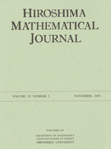
Hiroshima Mathematical Journal
A Legacy of Mathematical Research and DiscoveryThe Hiroshima Mathematical Journal, published by Hiroshima University, Graduate School of Science, serves as a prominent platform for disseminating high-quality research in the field of mathematics. Established in 1959, the journal has been an integral part of the mathematical community, focusing on areas such as Algebra, Number Theory, Analysis, and Geometry and Topology. Although currently classified in Q4 quartile rankings within its categories, the journal is committed to advancing mathematical knowledge and fostering scholarly dialogue. Its accessibility, combined with its long-standing history, makes it an essential resource for researchers, professionals, and students dedicated to exploring and enhancing the mathematical sciences. For those interested in contributing or accessing cutting-edge research, the Hiroshima Mathematical Journal continues to uphold its mission of excellence in mathematical scholarship.
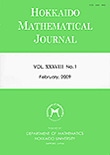
Hokkaido Mathematical Journal
Advancing mathematical frontiers through rigorous research.Hokkaido Mathematical Journal, published by Hokkaido University, Department of Mathematics, stands as a pivotal platform for scholarly discourse in the field of mathematics. Established in 1972, this peer-reviewed journal has consistently contributed to the advancement of mathematical research, covering a wide spectrum of topics within the discipline. With its current ranking in the third quartile (Q3) among miscellaneous mathematics journals, it offers valuable insights and findings that cater to both established researchers and budding mathematicians alike. The journal is accessible through traditional subscription, fostering a community that values rigorous theoretical exploration and applied mathematical methods. As it approaches its convergence year in 2024, Hokkaido Mathematical Journal remains essential for those dedicated to pushing the boundaries of mathematical knowledge and innovation in Japan and beyond.

Cambridge Journal of Mathematics
Advancing Mathematical Frontiers with Every IssueCambridge Journal of Mathematics, published by INT PRESS BOSTON, INC, is a premier platform for the dissemination of cutting-edge research in the field of mathematics. With an ISSN of 2168-0930 and E-ISSN 2168-0949, this journal stands out in a competitive academic landscape, currently ranked #58 out of 399 in General Mathematics, placing it in the top 15% within its category according to Scopus metrics. The journal serves as a vital resource for researchers, professionals, and students alike, aiming to foster groundbreaking mathematical inquiries and foster collaboration across disciplines. Published from 2020 to 2024, the Cambridge Journal of Mathematics is committed to maintaining high standards of scholarship, making it an essential read for those who are passionate about advancing mathematical knowledge and its applications.

MEMOIRS OF THE AMERICAN MATHEMATICAL SOCIETY
Where Rigorous Research Meets Innovative Solutions.MEMOIRS OF THE AMERICAN MATHEMATICAL SOCIETY, published by the American Mathematical Society, stands as a pillar in the field of mathematics, showcasing rigorous research and comprehensive studies that significantly advance the discipline. With a distinguished history indexed under ISSN 0065-9266 and E-ISSN 1947-6221, this journal features work from leading mathematicians, primarily focusing on both applied and theoretical aspects of mathematics. Over the years, it has continuously ranked in the Q1 category for both Applied Mathematics and Miscellaneous Mathematics, reflecting its high impact within the academic community. The journal maintains its relevance and accessibility through stringent peer-review practices, aiming to foster innovative mathematical ideas and solutions from 1996 to 2006 and from 2009 onward, until 2024. With its impressive Scopus rankings and a strong percentile standing, MEMOIRS OF THE AMERICAN MATHEMATICAL SOCIETY is an essential resource for researchers, professionals, and students alike, dedicated to enriching and broadening the understanding of mathematical sciences.
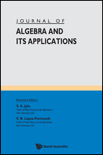
JOURNAL OF ALGEBRA AND ITS APPLICATIONS
Exploring the Frontiers of Algebra and Its ApplicationsJOURNAL OF ALGEBRA AND ITS APPLICATIONS, published by WORLD SCIENTIFIC PUBL CO PTE LTD, stands as a pivotal resource for scholars in the fields of Algebra and Applied Mathematics. With an ISSN of 0219-4988 and E-ISSN 1793-6829, this journal has been providing a forum for the dissemination of cutting-edge research since its inception in 2008, converging towards a forward-looking timeline extending to 2024. As of 2023, it has earned a commendable Q2 ranking in both Algebra and Number Theory, as well as Applied Mathematics, reflecting its solid impact within the mathematical community. With a Scopus rank of #49/119 in Algebra and Number Theory, and #420/635 in Applied Mathematics, the journal captures significant advancements and applications across various mathematical domains. While it does not operate under an open access model, its comprehensive articles and research outputs are crucial for fostering intellectual dialogue and innovation in academia. Researchers, professionals, and students alike will find this journal an indispensable asset for their scientific pursuits and explorations into the vast field of mathematics.

MICHIGAN MATHEMATICAL JOURNAL
Fostering Collaboration in Cutting-Edge Mathematical ResearchThe MICHIGAN MATHEMATICAL JOURNAL is a prestigious and influential publication in the field of mathematics, founded by the University of Michigan. With an ISSN of 0026-2285 and an E-ISSN of 1945-2365, this journal is recognized for its high-quality research and has achieved a commendable Q1 ranking in the category of Mathematics (miscellaneous) as of 2023. Published by the esteemed Michigan Mathematical Journal, it provides a platform for the dissemination of innovative mathematical theories and findings, playing a crucial role in advancing knowledge and scholarship within the mathematical community. With coverage spanning from 1996 to 2024, the journal emphasizes rigorous theoretical development and fosters collaboration among researchers, professionals, and students alike. While not an open-access journal, its contributions are invaluable for those looking to stay abreast of cutting-edge mathematical research.

Selecta Mathematica-New Series
To Inspire, Innovate, and Illuminate Research.Selecta Mathematica-New Series is a premier academic journal published by Springer International Publishing AG, based in Switzerland. With an impressive impact in the fields of Mathematics and Physics, it is recognized in the Q1 category for both Mathematics (Miscellaneous) and Physics and Astronomy (Miscellaneous) as of 2023. Established in 1995, the journal provides a platform for rigorous peer-reviewed research, facilitating the dissemination of groundbreaking findings and theoretical advancements through its converged publication years up to 2024. Researchers and scholars seeking to stay at the forefront of mathematical and physical sciences will benefit from the journal's diverse scope and high-impact articles. Although it does not operate under an open-access model, Selecta Mathematica-New Series remains a vital resource for building knowledge and fostering collaboration among professionals and students engaged in these dynamic fields. Access to its content is essential for those aiming to deepen their understanding and contribute to the ongoing dialogue within the scientific community.
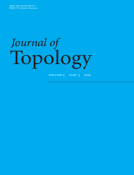
Journal of Topology
Elevating the Discourse in Geometry and TopologyThe Journal of Topology, published by WILEY, is an esteemed peer-reviewed journal that has been at the forefront of the field since its inception in 2008. With an ISSN of 1753-8416 and an E-ISSN of 1753-8424, this journal is dedicated to the fundamental and applied aspects of topology, offering a platform for innovative research and critical findings in this vital area of mathematics. As a recognized leader in its category, the journal proudly holds a Q1 ranking in Geometry and Topology, reflecting its impact and contribution to the academic community, with a Scopus rank of #25 out of 106 in its field, placing it in the 76th percentile. Researchers and professionals can access high-quality articles that advance theoretical knowledge and practical applications, enhancing the mathematical literature and serving as a valuable resource for students and scholars alike. With ongoing publication until 2024, The Journal of Topology continues to shape the discourse in geometry and topology, making it an essential read for anyone involved in the field.

Honam Mathematical Journal
Advancing mathematical frontiers through rigorous research.The Honam Mathematical Journal, published by the prestigious Honam Mathematical Society, is a distinguished platform dedicated to advancing research and dissemination in the field of mathematics. With its ISSN 1225-293X and E-ISSN 2288-6176, this journal serves as a conduit for innovative mathematical studies, covering a broad spectrum of topics encompassing both theoretical and applied mathematics. Based in Gwangju, South Korea, at the Department of Mathematics, Chosun University, it aims to foster global collaboration and knowledge exchange among researchers, professionals, and students alike. Although the journal does not currently offer open access, it maintains a commitment to high scholarly standards, which is reflected in its comprehensive peer-review process. The Honam Mathematical Journal stands as a vital resource in the mathematical community, contributing significantly to the development and application of mathematical thought in various scientific disciplines.
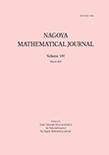
NAGOYA MATHEMATICAL JOURNAL
Connecting Scholars to Cutting-Edge Mathematical InsightsNAGOA MATHEMATICAL JOURNAL, published by Cambridge University Press, is a prestigious journal that has been at the forefront of advancing mathematical scholarship since its inception in 1950. With an ISSN of 0027-7630 and an E-ISSN of 2152-6842, this journal has gained recognition for its high-quality research contributions in the field of mathematics, achieving a Q1 classification in Mathematics (miscellaneous) as of 2023. The journal’s impact is further reflected in its Scopus rank of #164 out of 399 in the General Mathematics category, positioning it within the 59th percentile of its peers. Scholars, researchers, and students can access a range of innovative mathematical studies that explore diverse topics, fostering a vibrant dialogue within the mathematical community. By catering to a global audience, the NAGOYA MATHEMATICAL JOURNAL continues to play a critical role in shaping contemporary mathematical discourse and research.